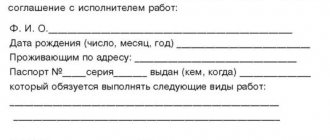Contract and employment contract - what they have in common and how they differ: comparison table
At first glance, a work contract (hereinafter referred to as DP) and an employment contract (hereinafter referred to as TD) regulate very similar relationships. Both are aimed at performing work by one party (employee/contractor) for a certain remuneration paid to it by the other party (employer/customer).
A detailed analysis reveals significant differences between an employment contract and a work contract, the first and most important of which lies in different areas of legal regulation. DP refers to the mass of numerous civil contracts and is regulated by the norms of Chapter. 37 of the Civil Code of the Russian Federation (hereinafter referred to as the Civil Code of the Russian Federation). TD lies in the plane of labor relations that have nothing in common with the civil law sphere, and is regulated exclusively by the norms of labor legislation.
Let's analyze the differences between a work contract and an employment contract in the table.
You can find more complete information on the topic in ConsultantPlus. Full and free access to the system for 2 days.
Next, we will consider in detail how a work contract differs from an employment contract.
https://youtu.be/3Cjlsxw-9JU
The legislative framework
A work contract is a civil agreement, the procedure for conclusion and operation of which is regulated by the Civil Code (37 Civil Code of the Russian Federation). This type of relationship, according to current legislation, represents an obligation to perform certain work specified in this agreement.
From a legal point of view, a construction contract represents mutual obligations of the parties, one of which is the contractor, and the other is the customer. In this case, the contractor undertakes the obligation to perform the agreed work, according to the customer’s instructions, as well as to deliver the work within the time period specified in the contract. Accordingly, the customer must accept the work performed and also pay for it.
Important! A work contract is a civil law agreement under which one party (Contractor), on the instructions of the other party (Customer), undertakes to perform certain work, as well as deliver the result of this work to the customer.
Parties to the contract and employment contract
The parties to the contracts in question are in different positions in relation to each other.
In the DP, the customer and the contractor act as equal counterparties. Moreover, it is characterized by the reciprocal nature of the fulfillment of obligations. So, having completed the work, the contractor waits for payment from the customer (Article 711 of the Civil Code of the Russian Federation). The customer, having made an advance, expects the contractor to begin work and purchase materials. The contractor, in turn, has the right to suspend work if the customer does not fulfill his obligations (Article 719 of the Civil Code of the Russian Federation).
In TD, the subordinate position of the employee to the employer is obvious. If an employee does not perform his work properly, the employer has the right to dismiss him under the relevant article, but is obliged to pay wages on time for the period worked. The employee is obliged to strictly observe the internal labor regulations, perform labor functions in accordance with the job description, that is, obey the manager (Article 56 of the Labor Code of the Russian Federation). At the same time, the employer is also by no means free in his decisions: for example, an employee can be fired only on the grounds provided for in the Labor Code of the Russian Federation (Article 77), while the employee has the right to terminate the employment contract at any time at his own request (Article 80 of the Labor Code RF).
Moreover, the employer has a wide range of responsibilities to respect the social rights of the employee:
- on the provision of paid vacations and sick leave;
- accident insurance and social insurance, etc.
Rights and obligations of the parties
Employer: The customer is obliged to provide assistance as provided for in the agreement. In particular, this applies to the provision of materials and tools, if such a clause is included in the contract.
If the quality is inadequate or the deadlines are not met, the customer has the right to refuse the agreement and not pay for it. You can also demand correction of defects. Next, the customer pays for the work.
We invite you to familiarize yourself with what to include in an apartment rental agreement
Contractor: The main responsibility is to complete the task within the specified time frame. The quality must correspond to what is declared.
If defects are discovered or low-quality materials are used, the contractor will be obliged to correct the defect at his own expense.
If this is not possible, the customer may terminate the contract and not make payment.
In addition, the contractor is obliged to promptly inform about any difficulties during the work.
Subject of agreements
The subject of the DP is the implementation of a specific amount of work with the obligatory planned achievement of a specific result (clause 1 of Article 703 of the Civil Code of the Russian Federation). As soon as the result is achieved, the contract terminates if the parties have no claims against each other.
The characteristic and main feature of TD is that its subject is precisely the work process, i.e., the time-extended process of an employee performing a certain labor function (Article 56 of the Labor Code of the Russian Federation). When concluding a TD, the employee is not given the goal of achieving any one specific materialized result. The employee must correspond to the position held according to his profession, specialty, qualifications, and experience.
What matters is the personal performance of the work by the employee, while in contracting relationships it is possible to delegate the work under a subcontract agreement (Article 706 of the Civil Code of the Russian Federation).
In a contracting relationship, the contractor is not controlled by the customer. Work schedules, provision of the site or equipment for it must be established by agreement of the parties. In labor relations, the employer not only dictates the procedure for performing work, but is also obliged to provide the employee with normal working conditions.
How is it concluded?
When drawing up any agreement, it is necessary to include the essential terms of the transaction in the text of the document. For a contract document, this is the subject of the agreement, the deadline for completing the work, and the price of the order being completed.
The subject of the contract is the volume and content of the order. Also included are points about methods of its production or processing. The final result must be indicated.
According to Article 708 of the Civil Code of the Russian Federation, it is required to fix the timing of the order - the period of validity of the agreement.
An essential aspect is the price, which is set in accordance with the estimate.
The cost of the order can be approximate, which may change due to a certain situation, or fixed, which does not change until the order is submitted.
The contracting parties are considered the main point of the agreement. In a contract transaction, the customer and the contractor are both legal entities and entrepreneurs or capable citizens.
The rights and obligations of each participant are specified in the contract agreement. The main right of the customer is the requirement to fulfill a high-quality order on time. He can check how the work is being carried out. If specified in the contract, the customer must provide the contractor with all materials in a timely manner.
The Contractor is obliged to begin fulfilling the order on time. He must inform the customer about all possible deviations from the deadlines. The contractor must submit a report on the materials used to the employer.
The document should indicate how the work acceptance process will proceed. It can be carried out in stages with payment for each part of the order made, or it can be carried out after completion of all the work. The document may indicate possible advance payments.
If the contractor does not meet the deadline or delivers the order in an improper form, the employer has the right to withhold the amount for part of the work or not pay for the entire order.
In the photo you can see the completed document:
Remuneration in labor relations and price in a contract
Under both contracts, work is performed by the contractor for a certain remuneration, which makes them similar and very often creates confusion in the qualification of their legal nature. However, the payment due to the contractor in these two cases is of a different nature.
A distinctive feature of labor relations is the regular payment of monetary remuneration (wages) to the employee. The Labor Code of the Russian Federation establishes strict rules for the payment of wages:
- it cannot be less than the minimum wage (paragraph 3 of article 133 of the Labor Code of the Russian Federation);
- must be paid at least once every half month (paragraph 6 of Article 136 of the Labor Code of the Russian Federation);
- the salary structure includes salary and various allowances, as well as incentive and compensation payments (bonuses, allowances for harmful and dangerous working conditions, Article 129 of the Labor Code of the Russian Federation).
The salary is set in the TD in accordance with the remuneration system adopted by the employer on the basis of local regulations and collective agreements (Article 135 of the Labor Code of the Russian Federation). The employer bears administrative and criminal liability for delayed payment of wages.
The price in the DP is established by agreement of the parties, and in its absence is determined in accordance with clause 3 of Art. 424 Civil Code of the Russian Federation. Structurally, the price represents a payment for the materials used (if contractor materials are used) and the contractor’s actual remuneration.
The most important difference between the salary under an employment contract and the price in a contract is that, as a general rule, the latter is paid upon completion of the work (achievement of the result). Advance payments are possible, but they are not periodic payments.
Pros and cons, risks
For the customer: it is beneficial for companies to contact a contractor if they need to perform one-time work .
For example, to renovate a room.
It is not advisable to hire builders to the permanent headquarters of a company or enter into a short-term employment contract with them.
For the contractor: the main disadvantage for an individual is the fact that the contract is not an employment contract .
It follows that the contractor is deprived of many fundamental guarantees , such as the right to sick leave, vacation, and so on.
He has more personal freedom, which means more responsibility. All these shortcomings are compensated if the contract is concluded by a legal entity in which the employee is listed as an ordinary employee.
There are three main types of risk :
- Accidental loss of property - the party that provides the tools and materials assumes the risk of accidental loss of property.
- The inability to complete a task is the performer's risk. If the task is not completed, the contractor does not receive payment.
- Increased costs are the customer's risk. The final cost may sometimes exceed the expected price. For a significant excess in cost, two conditions must be met. The first condition is timely warning to the customer. The second condition is a reasoned justification for such an excess.
Duration in contracts
The DP is always concluded for a specific period, which also acts as its essential condition (Article 708 of the Civil Code of the Russian Federation). Without agreeing on the start and end dates of the work, the DP is not concluded. For the customer, achieving the result of the work within the agreed time frame is of fundamental importance. Violation of deadlines refers to significant violations on the part of the contractor and is grounds for termination of the contract by the customer and a claim for damages.
Unlike a work contract, an employment contract, as a general rule, is concluded for an indefinite period and is terminated only by the dismissal of an employee on one of the grounds provided for by the Labor Code of the Russian Federation. However, it can also be urgent (Article 59 of the Labor Code of the Russian Federation), which in this case creates a visible similarity with the DP. In a fixed-term contract, the establishment of a deadline is determined by the specifics of the work (for example, seasonal work, the work of artists, etc.), but the key importance is still the process itself, and not the achievement of a specific result. In cases with urgent TD, difficulties are most often encountered in distinguishing it from DP.
Concept
What is a contract employment contract?
A work contract is an agreement to carry out work that is of a distinctly material nature. This means that the scope of work is known and defined from the very beginning.
https://youtu.be/V2TYYybxY40
The final result can only be a specific material thing.
The provision of a service cannot be included in the contract.
The main provisions are determined by Article 702 of the Civil Code.
There are two parties to the agreement - the customer and the contractor.
The contractor is the performer, the customer pays for the work.
In essence, the customer is the employer, although there are some comments here.
Contracting is largely regulated by the Civil Code, but is supplemented by legislation from other areas.
These include: consumer rights, laws on investment activities and others.
Decor
Parties to the agreement: the main parties are the customer and the contractor.
The customer gives the task and pays for it.
The contractor is the performer.
The executor of a contract may be an individual entrepreneur, an individual, or a legal entity.
The participation of subcontractors is allowed , that is, performers who help in completing the task.
In this case, the main contractor is called the general contractor. An analogue for the customer side is the concept of a single customer .
Form: a standard form is not required by law . The contract must necessarily contain a material result - the creation or modification of any object.
Information about the contract is not entered into the contractor’s work book. According to the law, the customer does not have the right to record information in this document.
The next important element is timing. Be sure to indicate the start and end dates . It is allowed to allocate intermediate deadlines - these are control points for completing the task. They are especially suitable for long-term work.
The final cost may not be indicated directly, but by indicating the method of its calculation. Otherwise, payment is made based on the level of payment for similar work .








